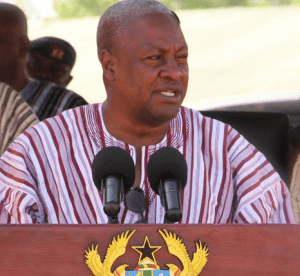I won’t authorize expenditure on wages – Mahama

President John Dramani Mahama on Wednesday indicated that government would not authorize any expenditure on wages and compensations not captured in the national budget.
Government, he said, would rather negotiate in good faith with striking doctors and other professionals on their conditions of service based on terms that were fiscally feasible.
“Fiscal discipline requires that not a single pesewa is spent on remuneration outside what has been budgeted for.”
President Mahama, who was speaking at the 80th anniversary of the Ghana Registered Midwives’ Association in Accra yesterday, stressed that government would not accede to demands that could collapse the single spine pay policy and throw the economy out of gear.
President Mahama said he was determined to hold the line, no matter the political cost.
“Our people have sacrificed enough, we cannot afford another round of belt-tightening after the electoral cycle is over,” adding that the current IMF extended credit facility should be the last time the country would rely on the Bretton Wood institution for any financial remedy.
He said the policy to strictly follow the dictates of the budget as far as expenditure was concerned, applied to both Article 71 office holders and those on the single spine, saying that it goes for the President as well as the lowest public sector employee.
Medical doctors in the public sector are on strike in connection with issues concerning their service conditions, and are currently only attending to emergency cases, threatening to totally withdraw their services en mass, if their demands are not met.
The government, which was negotiating with the medical doctors, had decried the strike action. It described the action as illegitimate, especially when negotiations were on-going, and had asked the doctors to return to work.
The doctors had, however, vowed not to return to work until they had seen a signed document by government, detailing their conditions of service.
President Mahama recalled that in 2012 during the implementation of the Single Spine Salary Structure, pressures from various groups led to the award of interim premiums and other compensatory allowances whose net effect ballooned the wage bill from about GH¢3 billion GH¢8 billion.
That, he added, consumed nearly 73 per cent of total tax revenues in wages and compensation alone, with negative effects still haunting the Ghanaian economy.
“We have managed, without retrenching any public sector staff, to tame the impact of wages and compensation as a percentage of tax revenues from the high of 73 per cent to 49 per cent currently.”
President Mahama said there were 598,000 other public sector workers organized in 11 other professional groups waiting to see how the doctors would be treated before putting up their demands, a situation he said could cripple the economy.
“This will adversely affect the single spine pay policy and could result in breaking the spine.”
President Mahama lauded the midwives for the professionalism they were exhibiting in their daily activities, noting that the achievements made in the MDGs Goals Four and Five were largely due to the efforts of the midwives.
He pledged to build more midwifery training schools in all the regional capitals, and also expressed government’s readiness to support the career progression and enhancement of the skills of midwives.
Mrs Joyce Jetuah, President of the Ghana Midwives Association argued for the Association to be granted bargaining power now that it was recognized as an autonomous institution.
She indicated that midwives could assist in improving access to health if the government assisted them to set up maternity homes in the rural areas instead of re-engaging them after retirement to augment domiciliary midwifery in the country.
Mrs. Frances Day-Stirk, President of the International Confederation of Midwives, noted that Ghana had made strides in new-born and maternal mortality reduction, attributing the successes to government’s intervention in the implementation of free maternal services, safe motherhood task force and other initiatives.
She called for the training of at least 10,000 more midwives in the country to meet the health demands of mothers.
Source: GNA
